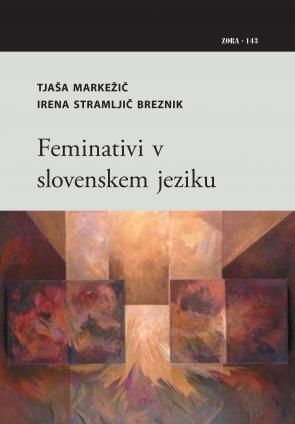Feminativi v slovenskem jeziku
Keywords:
word-formation, feminative, eminatives derived from common nouns, feminatives derived from proper nouns, suffix productivity, suffix combinationSynopsis
Feminatives in the Slovene Language. The monograph deals with the word-formation potential of the Slovene language and other languages, in particular Slavic ones, to form feminine variants of masculine terms derived from base words denoting actions, properties and char-acteristics. The approach adopted in the book is interdisciplinary: sociological, linguocultural and linguistic.
The first part of the monograph presents a sociological approach to the discussion of the social value of gender and the changing position of women in Europe and Slovenia. The roots of women’s liberation movement date back to the time of enlightenment and later the French revolution, which demanded gender equality. Historically, the West experienced three waves of feminism and these movements also provided inspiration for the fight of Slovene women for equal rights and a better social status.
The second part of the monograph is based on a linguocultural approach to the study of social attitudes to gender and social differences between men and women in different spheres of life that are expressed through language. The fact that masculine terms for professions or social positions can be used for female referents may be explained with the help of the theory of markedness of gram-matical categories. According to this theory, grammatical genders are related in the following way: neuter gender is marked in relation to masculine and feminine gender, and feminine gender is marked in relation to masculine gender. The role of unmarked gender, i.e. the neutralising function in the coordination of words f different genders, is thus the domain of masculine gender. However, such a typological explanation is not accepted universally and could be seen as a sign of discrimination against women, as it does not account for social influences.
Taking into account the above approaches, the third part of the monograph con-centrates on the third, central approach, i.e. the linguistic approach. The linguistic approach explains feminine terms within the category of feminatives in terms of general word-formation processes and different base-affix combinations. This section presents different theoretical views, especially differences in the inter-pretation of what is called the substitution type of feminatives. Following the traditional explanations in Slovene scholarly literature, here such formations are interpreted as derivations of the modification type created through two word-for-mation principles: a) substitution and b) addition of feminine suffixes to mascu-line bases. This approach presents a clear and unified methodology, keeping the substitution type of feminine formations within the category of feminatives. The first argument in favour of such an approach is that it enables the preservation of a unified category of feminatives as formations of a modification type. Femi-nine forms are derived from masculine terms either through adding the feminine suffix (tisk-ar – tisk-ar-ka) or through substituting the masculine suffix with the feminine suffix (bor-ec – bor-ka). Similarly, masculine terms which are derived from feminine terms, i.e. masculinatives, are created through adding a masculine suffix (gospod-inja – gospod-inj-ec) or through substituting the masculine suffix with the feminine suffix. (žanj-ica – žanj-ec). The second argument in favour of such an interpretation is the historical development of the Slavic word-formation pattern of the morphemic substitution of masculine suffixes with feminine suffix-es, evidence for which exists in Slavic common and proper nouns. Other similar pairs from Slovene dialects also show that formations with the suffix -ica are feminatives in relation to the base ending in -ec.
Such a unified interpretation of feminatives enables a proper study of the use of suffixes in common nouns comprising feminine terms for people and animals, as well as in proper nouns for female inhabitants or surname feminatives. The data was gathered from all accessible web dictionaries, especially from SSKJ1, SSKJ2 and the corpus Gigafida 2.0. According to expectations, the results show that feminine suffixes are highly productive due to their limited number. The re-search, which is based on a linguistic approach without an ideological framework, presents some new findings on the distribution and form of feminatives: a) the substitution type of feminatives is slightly more frequent, b) the most productive suffixes are -ka, -ica, -inja, with -ka surpassing all other suffixes as the most important suffix used for feminative modification derivation, c) the distribution of feminative formations has increased, which is also evident in current dictionaries.
The findings of this lexicological research are based on extensive data and offer a basis for further lexicographical studies that would enable the creation of a dic-tionary of Slovene feminatives. Such a dictionary could also contain information about the use of different variants of feminatives with the same root to be able to explain preferences for the use of masculine forms over feminine forms and the use of some suffixes over other suffixes in the case of feminative variants with different suffixes.
Downloads






